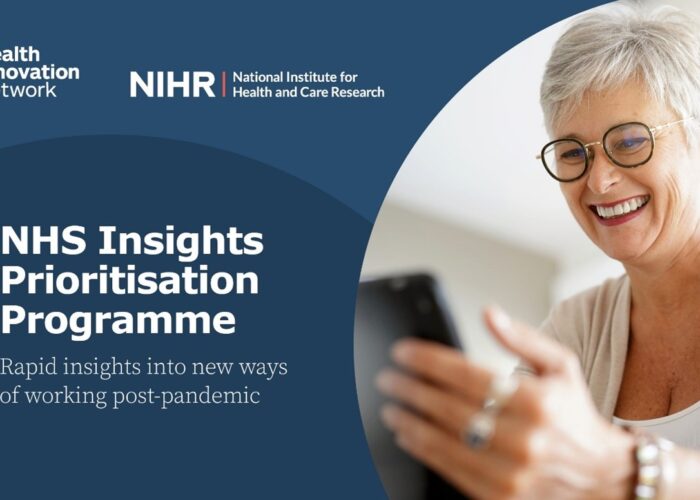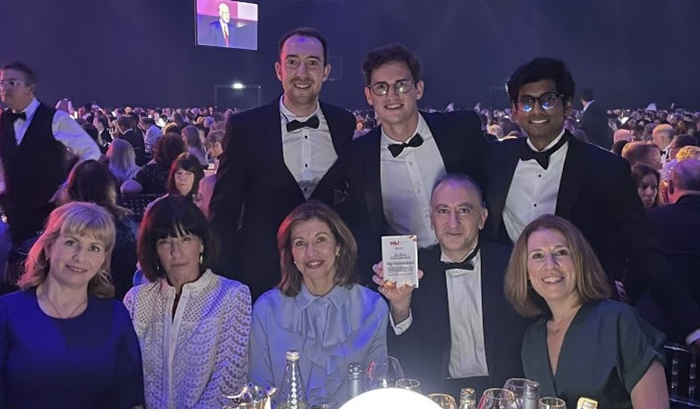Adoma Adjei and Fisayo Banjoko reflect on their time at Imperial College Health Partners over the summer as part of Health Data Research UK’s Black Internship Programme.

Data Science in Health is a rapidly expanding field with a high demand for experienced and motivated individuals. There is currently a large underrepresentation of Black people within this sector and the HDR UK Black internship offers a brilliant opportunity for talented students looking to get the experience they need to kickstart an exciting career in data science in Health, and for employers looking to gain the benefit of intelligent and enthusiastic individuals at the start of their career path.
ICHP were delighted to welcome two fantastic data science interns this summer. Adoma and Fisayo worked closely with us on two impactful projects relating to population health management. Both interns demonstrated a clear interest and passion for improving health outcomes throughout their time with us, and a desire to learn and improve their analytical and professional skills. They gained experience in presenting findings, organising work events, chairing meetings, and contributing to our organisational strategy in our Equality, Diversity and Inclusion group.
To mark National Inclusion week, and to highlight the brilliant HDR UK internship programme we are proud to participate in, we asked Adoma and Fisayo to share their reflections on their experience at ICHP.
At ICHP, diversity in our workplace is vital to our ability to serve our local population, and we thank both HDR UK for the opportunity to host the interns, and Adoma and Fisayo for being such brilliant team members. We wish them the very best in their next endeavours and exciting careers.
Jonathan Watkins, Health Research Advisor
Adoma Adjei

- What interested you in the ICHP placement?
Personally, my interest in this placement was rooted in observing how health data was being utilised to transform patients’ lives. I wanted to get a view ‘behind the scenes’ of health data scientists as well as seeing the roles of others (e.g., project leads, innovation advisors etc.) and how they collaborate to achieve objectives in making headway in healthcare.
- What have you worked on during your placement?
I had the fantastic opportunity to work with Rafal Kulakowski in line with the Population Health and Management Inequalities (PHMI) study. My project involved investigating the effect of socioeconomic factors on disease prevalence and healthcare quality using data from WSIC. I deployed multiple poisson/negative binomial regressions to look at the counts of Long-Term Conditions (LTCs) and Disease outcomes using R Studio as well as with presenting data visualisations to see the relationships between socioeconomic variables and counts.
Additionally, I worked on an E&DI (Equalities, Diversity, Inclusion) data scoping task that involved looking at staff demographics (e.g., ethnicity, disability) and comparing them to other organisations such as Chelsea and Westminster NHS Foundation Trust. We also compared these to London as one of the aims of the ED&I strategy was to make sure that our workforce was reflective of the population we serve.
I am grateful for the report that I received from my supervisor and line manager as it allowed me to really expand my knowledge whilst being able to rely on them for help and guidance.
- What have you found most exciting/interesting/shocking during your placement?
During my placement, I have found the Brunch and Learn sessions, something ICHP offers to all staff on Friday mornings, really interesting. I particularly enjoyed the session on the Hamburg Health Kiosk, especially their identification of the need to combine the medical sector with social services.
I also found that despite my internship being remote, I was still able to form relationships and have a strong welcoming support system throughout, which was lovely. Despite everyone working remotely, things seem to run efficiently and effectively.
- What have you learnt about the NHS and/or healthcare data?
Having a demonstration of FARSITE was extremely fascinating. It was interesting to see how effective this profiling tool was for searching, finding, and contacting patients with research opportunities, whilst still preserving their confidentiality. It was also interesting to see how the tool could quickly match you up to eligible patients and how you could easily filter the criteria.
- What would you say to anyone considering a placement like this?
I would tell them to dive right in and to grasp this opportunity. There are a lot of skills to be gained. It really is an invaluable experience to immerse yourself fully in the health data science research world.
Fisayo Banjoko

What interested you in the ICHP placement?
Before I started the internship, I was interested in how data analysis was performed with healthcare data. However, when the internship started my interests grew from just the analysis of healthcare data to how data is collected from individuals, how data is deidentified, stored and how the database is queried. My interest also grew in the non-technical aspects of processing health data such as, strategy, planning, ensuring proper data representation and reducing bias.
2. What have you worked on during your placement?
My internship project was centered on the ‘Analysis of Healthcare Services Accessed by Unpaid Carers’, where I analysed and made statistical inferences about unpaid carer’s access to outpatient services before and after Covid, and unpaid carer’s access to accident and emergency care services.
I learnt to select the best model for a dataset, and I used new statistical methods such as Poisson regression, chi-square test, correlation and overdispersion tests. I also did some data extraction for the Equality, Inclusion and Diversity team, where I extracted relevant staff demographics and compared the staff demographics of ICHP, a similar organisation and North West London.
3. What have you found most exciting/interesting/shocking during your placement?
I was pleasantly shocked at the many processes involved in healthcare data processing. I found it interesting that each team, including the non-technical ones, were cogs that made processing healthcare data possible. I was also impressed at how staff health in ICHP was prioritised with fitness and sporting activities
4. What have you learnt about the NHS and/or healthcare data?
I learnt about the structure of the NHS, and the important role ICHP plays in that structure. I learnt that the NHS is made up of organisations that often work independently from each other, which can have a negative impact on healthcare experience. To better meet healthcare needs, organisations like ICHP were created by the NHS to support complex change across the health and care sector – innovating and collaborating for a healthier population. I also learnt how the Health and Care Act 2022 will make it easier for health and care organisations to deliver joined-up care for people.
5. What would you say to anyone considering a placement like this?
A placement like this is a great opportunity to better understand and gain relevant experience in the field you are interested. Working with, being mentored by and learning from experienced professionals in your field is an irreplaceable experience and will give you a major boost in your career. You will also learn useful career tips and network with other professionals and your peers.
To find out more about internship opportunities at Imperial College Health Partners, email recruitment@imperialcollegehealthpartners.com.



